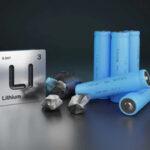Lithium Compounds: Essential Elements Fueling The Advancement Of Battery Technology A Deep Dive

Lithium
Lithium Is A Soft, Silvery-White Metal That Belongs To The Alkali Metal Group In The Periodic Table. It Has The Chemical Symbol Li And Atomic Number 3. Lithium Is Highly Reactive And Does Not Exist Naturally In Its Metallic Form In Nature. Instead, It Forms Ionic Compounds Like Lithium Carbonate And Lithium Chloride. Lithium Is The Lightest Solid Element And Is A Powerful Reducing Agent. It Floats On Water And Is A Good Conductor Of Heat And Electricity.
Compounds In Batteries
One Of The Most Important Applications Of Compounds Is In Batteries. Lithium-Ion Batteries Typically Use Lithium Compound Cobalt Oxide As The Cathode And Graphite As The Anode. Lithium Ions Shuttle Between These Electrodes During The Charge-Discharge Processes. Lithium Cobalt Oxide Has A Layered Structure That Allows Easy Insertion And Extraction Of Lithium Ions. The Use Of Lithium Cobalt Oxide Increased The Battery Voltage And Energy Density Compared To Earlier Battery Chemistries Like Lead-Acid And Nickel-Cadmium.
Lithium Ion Batteries Now Power Most Portable Electronics From Smartphones To Laptops. They Are Also Increasingly Being Used In Electric Vehicles Due To Their High Energy Density. However, Cobalt Is Toxic And Its Mining Raises Environmental And Social Issues. Hence, Alternative Lithium Metal Oxide Compounds Are Being Developed. Lithium Iron Phosphate, Lithium Manganese Oxide, Lithium Nickel Manganese Cobalt Oxide Are Some Examples. Lithium Iron Phosphate Offers Better Safety Compared To Lithium Cobalt Oxide. Alternating The Transition Metal Ions Alters Properties Like Operating Voltage, Capacity, Cycling Stability, Cost Etc.
Lithium Compounds In Glass And Ceramics
Lithium Compounds Are Widely Used As Additives In Glass And Ceramics Production. The Addition Of Lithium Carbonate Or Lithium Oxide Reduces The Melting Point And Viscosity Of Glass. This Allows Glass Production At Lower Temperatures, Reducing Energy Consumption. Lithium Silicate Glasses Have High Thermal Shock Resistance Making Them Suitable For Scientific Equipment And Automobile Windows.
In Ceramics, Compounds Act As Sintering Aids Promoting Densification At Lower Temperatures. They Improve Mechanical Properties And Decrease Electrical Conductivity Of Ceramics. This Makes Ceramics Suitable For Applications Requiring Electrical Insulation. For Example, Addition Of Lithium Carbonate Enhances The Properties Of Aluminosilicate Ceramics Used In High Voltage Insulators. Lithium Metasilicate Promotes Sintering Of Cordierite Ceramics Used In Catalytic Converters And Honeycomb Structures.
Lithium Compounds As Lubricants
Solid Lubricants Containing Compounds Are Used Where Liquid Lubricants Cannot Be Used. They Provide Lubrication At High Temperatures And In Vacuum Conditions. Lithium Stearate, Lithium Hydroxystearate And Lithium 12-Hydroxystearate Are Some Important Solid Lubricants. They Have Long Molecular Chains That Can Align And Slide Past Each Other. The Lithium Ions Bond The Chains Together While Allowing Slippage.
Lithium Soaps Like Lithium Stearate Are Used As Extreme Pressure Additives In Greases. They Are Added To Greases Used In Jet Aircraft Engines And Automobile Transmissions Operating Under High Loads. Lithium Complex Soaps Provide Lubrication Up To 350°C Without Liquefying Or Oxidizing. Lithium Disulfide Is Used As A High Temperature Lubricant Up To 900°C. It Lubricates Parts In Industries Like Steel Manufacturing Where High Heat Is Generated. Solid Lubricant Films Containing Compounds Are Used In Vacuum Conditions In Spacesuits And Satellites.
Compounds In Other Applications
In Addition To The Applications Discussed Above, Compounds Also Find Many Miscellaneous Uses. Lithium Fluoride And Lithium Bromide Are Used To Make Specialized Glass Ceramics And Optics Due To Their High Transmission In Infrared Region. Lithium Hypochlorite Is Commonly Used To Disinfect Water Supplies As It Forms A Stable Solution. Lithium Niobate And Lithium Tantalate Are Important Piezoelectric And Pyroelectric Materials Used In Sensors,Frequency Generators And Electronics.
Lithium Carbonate And Lithium Chloride Are Important Electrolytes. Lithium Carbonate Is Used Medically To Treat Bipolar Disorder. It Alters Ion Flows In Brain To Produce Calming Effect. Nano Materials Containing Lithium Ions Are Explored For Hydrogen Storage Applications. Lithium Aluminium Hydride And Lithium Borohydride Are Used As Reducing Agents In Organic Chemistry. Lithium Is A Essential Nutrient, And Lithium Orotate Supplements Help Maintain Mood Balance. Overall, Compounds Have Diverse Scientific And Industrial Applications Leveraging Properties Like High Reactivity And Conductivity Of Lithium Ions
- Art
- Causes
- Crafts
- Dance
- Drinks
- Film
- Fitness
- Food
- Jocuri
- Gardening
- Health
- Home
- Literature
- Music
- Networking
- Alte
- Party
- Religion
- Shopping
- Sports
- Theater
- Wellness
- IT, Cloud, Software and Technology


